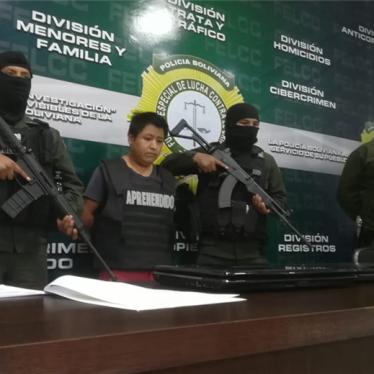(New York) — Peru's Truth and Reconciliation Commission needs support from all political sectors in the country, Human Rights Watch said today. Recently the commission has been the target of aggressive attacks by its political opponents in advance of the public release of its findings.
"The truth commission will offer Peruvians for the first time a comprehensive and objective account of the terrible violence that gripped the country for nearly two decades," said José Miguel Vivanco, Executive Director of the Americas Division of Human Rights Watch. "No doubt there are many who would prefer to suppress or muzzle its findings."
A Lima prosecutor has opened an investigation to decide whether to charge the twelve members of the commission with "advocating terrorism" (apología del terrorismo), a serious crime in Peru. A legislator sympathetic to former president Alberto Fujimori lodged the complaint because he objected to a video screened in June at a public hearing held by the commission.
In the video, which was broadcast by several television channels, four former members of Shining Path, the Maoist insurgency responsible for thousands of civilian deaths in the 1980s, and the Túpac Amaru Revolutionary Movement (MRTA), a smaller armed opposition group, expressed remorse for their actions.
Human Rights Watch has criticized the offense of "advocating terrorism" for being so vague and broad as to permit the imprisonment of people for exercising free speech. In January 2003, the Constitutional Court declared several provisions of Peru's anti-terrorism laws to be unconstitutional, including this one. However, the norm has yet to be formally repealed.
Adding to the pressure on the commission, opposition legislators have called for the commission to be investigated, for its findings to be kept secret, and even for it to be disbanded.
The Commission of Truth and Reconciliation was formed by former president Valentín Paniagua in June 2001. Its mandate is to provide an official record of violations of human rights and international humanitarian law committed in Peru between May 1980 and November 2000, and to recommend measures to strengthen human rights and democracy. It is scheduled to present a final report of its findings on August 28.
The commission has held numerous public hearings, collected over 17,000 testimonies, and has developed a unified register of "disappeared" persons. Far from exhibiting a bias toward armed opposition groups, it is expected to report that previous estimates of grave abuses committed by Shining Path were far too low.
It will also document grave human rights violations, including disappearances, extrajudicial executions, and torture, committed by official security forces during three successive governments: those of presidents Fernando Belaúnde, Alan García, and Alberto Fujimori.
In a July 23 letter to President Alejandro Toledo signed jointly with twelve other U.S.-based human rights groups, Human Rights Watch expressed "deep admiration" for the work of the commission. It urged President Toledo to introduce legislation to create a follow-up group to ensure the timely implementation of the commission's recommendations.
"In response to these attacks, President Toledo should declare his strong support for the commission's work and his commitment to publishing in full all of its findings," said Vivanco.






